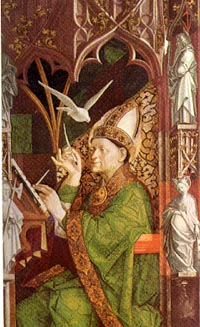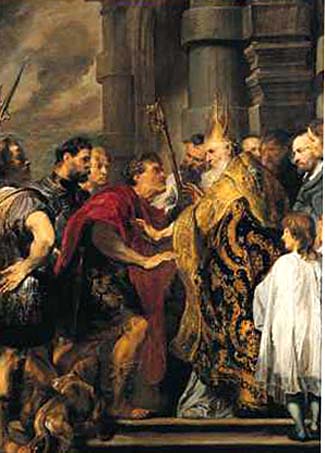 |
The Saint of the Day
St. Ambrose, December 7
Prof. Plinio Corrêa de Oliveira
Biographical selection:
St. Ambrose (c. 340-397) stood up to Theodosius, Roman Emperor of the West, to defend the rights of the Church; he wrote against and combated the Arian heretics; he converted St. Augustine.
Comments of Prof. Plinio:

St. Ambrose wrote defending the Church against the Arian heresy |
St. Ambrose left us two great examples from his life.
The first was what he did with St. Augustine.
St. Ambrose was a man of enormous talent, one of the Doctors of the Church, famous for his works and actions throughout both Christendom and the Roman Empire of his time. In his memoirs, St. Augustine wrote that he converted because of St. Ambrose. He described the true fascination he had for the great saint. Once in a while St. Augustine used to visit the episcopal house of St. Ambrose in Milan. He would sit in the same room with St. Ambrose just to watch him write and work. Many times, Ambrose did not have time to give to St. Augustine. But Augustine remained simply because he wanted to be in St. Ambrose's presence, taking advantage of the atmosphere created by him. It was mainly because of that atmosphere and some few conversations they had that St. Augustine converted.
One of the most important things St. Ambrose did was the conversion of St. Augustine, who, in turn, was one of the foremost lights of the Catholic Church. God asked St. Ambrose to write in defense of the Church, which did not permit him much time to dedicate to St. Augustine. Notwithstanding, in the silence and atmosphere of graces created by St. Ambrose, God converted Augustine, without interrupting the work of Ambrose. Here you have proof of the importance of the apostolate of presence.
Many people think that what counts the most is to work, talk and act. Of course, these things matter, but there is an apostolate of presence that can be more important. The silent apostolate that St. Ambrose made with St. Augustine is an eloquent proof of this.
According to the modern revolutionary mentality, St. Ambrose should have stopped his work and dedicated his time to Augustine. But this was not what he did. He trusted Divine Providence. It was the will of God for him to write, and so he wrote. He trusted that God would provide for the good of that soul - Augustine - who was seeking orientation. And God provided it.

St. Ambrose refused entrance to the Emperor Theodosius at the door of the Cathedral |
The second example was what he did in face of the Emperor Theodosius in 390.
The episode of St. Ambrose standing in the way of Theodosius on the porch of the Cathedral of Milan is one of the most glorious symbolic acts in the History of the Church.
Theodosius was the most powerful man of his time. St. Ambrose took issue with him because the Emperor had ordered an indiscriminate massacre of Thessalonian men, women and children after promising to show clemency. The Emperor tried to enter the Milan Cathedral, but was confronted at the door by St. Ambrose, solemnly dressed in his episcopal vestments and followed by his clergy. St. Ambrose refused to permit the Emperor to enter until he repented and made public penance. Theodosius humiliated himself and asked forgiveness. Only then did Ambrose permit him to enter the Cathedral.
This example of the spiritual power in face of the temporal power recalls a principle we should admire very much. That is, that human grandeur, even the highest, the noblest and the most glorified, should submit to the spiritual power. If a ruler does something wrong, he should be confronted by the spiritual power and made to submit because the highest human is nothing before God. In face of eternity, human grandeur fades away and becomes nothing. The only thing with permanence on this earth is the Holy Roman Catholic and Apostolic Church.
Bossuet said that the mission of the Church is to hold in check the earthly powers. The clergy and the Hierarchy should be able to humble the political and economic powers when they do not obey the decrees of God. The nobles, aristocrats, and plutocrats should be humiliated when they do not follow the laws of God.
How far we are from this ideal today! We witness the opposite: the spiritual power standing silent and humble before all kinds of politicians and businessmen, or even worse, trying to adapt the Church to the world.
Let us pray to St. Ambrose to give us the conviction he had of the supremacy of the spiritual power over the temporal, so that we might become the builders of the new Christendom, the Reign of Mary that will be installed on earth.


  | | Prof. Plinio Corrêa de Oliveira | |
The Saint of the Day features highlights from the lives of saints based on comments made by the late Prof. Plinio Corrêa de Oliveira. Following the example of St. John Bosco who used to make similar talks for the boys of his College, each evening it was Prof. Plinio’s custom to make a short commentary on the lives of the next day’s saint in a meeting for youth in order to encourage them in the practice of virtue and love for the Catholic Church. TIA thought that its readers could profit from these valuable commentaries.
The texts of both the biographical data and the comments come from personal notes taken by Atila S. Guimarães from 1964 to 1995. Given the fact that the source is a personal notebook, it is possible that at times the biographic notes transcribed here will not rigorously follow the original text read by Prof. Plinio. The commentaries have also been adapted and translated for TIA’s site.
|
Saint of the Day | Home | Books | CDs | Search | Contact Us | Donate

© 2002- Tradition in Action, Inc. All Rights Reserved
|
 |

|